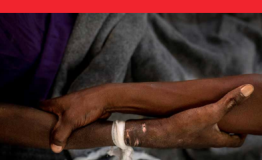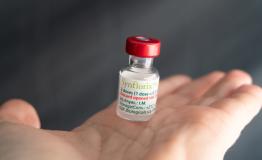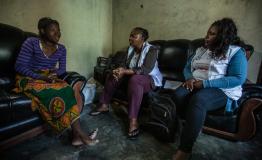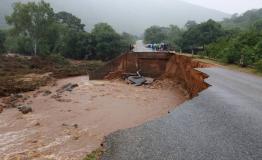

Malawi
Malawi is making progress in tackling HIV, but prevalence is still high at almost nine percent. In Chiradzulu, where the rate is 17 percent, MSF has been supporting HIV care for 15 years. Our focus is on vulnerable groups, such as children, adolescents, and patients whose first- and second-line antiretroviral (ARV) treatments are failing.
In Blantyre, MSF works with Queen Elizabeth Central Hospital to treat cervical cancer, a major public health issue due to high rates of HIV co-infection and inadequate screening and care. The programme includes health promotion, screening, surgery, chemotherapy and palliative care for advanced-stage cancer.

4,010
4,01
310
31
In 2020, COVID-19 forced reductions in our activity, although Malawi did not see a significant number of cases until the end of the year when a second wave hit. MSF supported the national response to the pandemic by assisting with infection prevention and control, triage, health promotion, and patient care at Nsanje district hospital.
In 2020, we closed or handed over to local authorities and community organisations three projects dedicated to specific groups: the advanced HIV project in rural Nsanje district to improve detection and treatment at community level, hospital care, and follow-up; our Chichiri prison project, which offered preventive tuberculosis (TB) treatment to over 1,000 patients through regular screenings, treatment and management of co-infections; and a female sex worker project, which implemented an innovative, peer-led approach, allowing almost 7,000 women to access HIV, TB and sexual and reproductive health services in the community, and one-stop clinics in Neno, Dedza and Nsanje districts.
No. staff in 2020: 492 (FTE) » Expenditure in 2020: €9.1 million MSF first worked in the country: 1986


Burden sharing or burden shifting?
![Grâce M’Gazio is a young mother about to give birth. She is doing the HIV – AIDS test with Adeline Ouaboua, psychosocial advisor at the Castors maternity, Central African Republic [© Elisa Fourt/MSF] Grâce M’Gazio is a young mother about to give birth. She is doing the HIV – AIDS test with Adeline Ouaboua, psychosocial advisor at the Castors maternity, Central African Republic [© Elisa Fourt/MSF]](/sites/default/files/styles/card_half/public/msfimages/news/msf243219_medium.jpg?itok=rvrljxRc)
The fight against HIV and TB is at a critical juncture

Gavi should stop awarding special funds to Pfizer and GSK for pneumonia vaccine

Mozambique: Peer educators support key and vulnerable populations to tackle HIV
